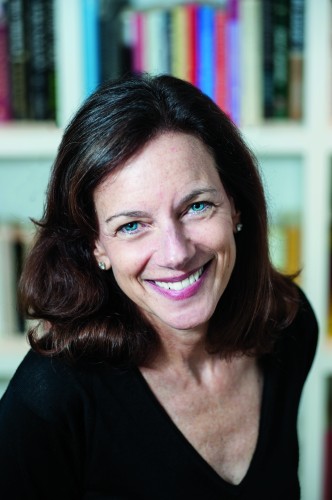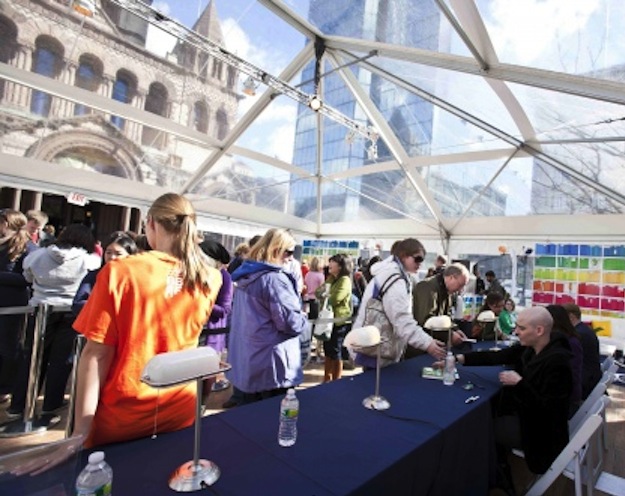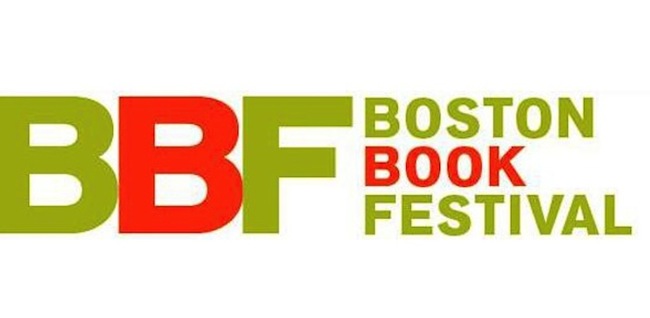Book Interview: The Boston Book Festival — Six Years On and Thriving
“The Boston Book Festival is doing really well. It feels like an established part of Boston’s cultural scene.”
By Bill Marx
Given the increasingly precarious health of the book industry and the decay of serious criticism in the mainstream media (virtual extinction in newspapers, magazines, and broadcast), it seemed a good time to check in on the Boston Book Festival (October 23 through 25). Literary gatherings like this in cities around the country are becoming increasingly important as challenging books, authors, and ideas are shoved to the cultural margins, tucked away in academic nooks, or corralled into online niches. This year’s free shindig – made up of presentations, panels, readings, writing seminars, and musical events – looks expansive and mind-stimulating, with such internationally-known authors as Dan Chiasson, Claire Messud, Susan Minot, Susana Kaysen, and Vikram Chandra slated to speak. Also worth pointing out — the BFF is one of the few American book festivals that regularly features writers published by academic presses.
Many of the panels intrigue, but readers of The Arts Fuse should take note of the “Where’s My Good Review?” discussion with Sir Peter Sothard, editor of the Times Literary Supplement. This magazine cares deeply about the answer to the question of “who has the responsibility for keeping criticism alive?” Truth is, most of the big name media outlets that claim to champion critical thinking about books are not stepping up in a significant way.
I sent Deborah Porter, BBF’s Founder and Executive Director, some questions via email regarding the condition of the BFF, the fragile state of the publishing industry, and her candidates for some of the standout moments in the festival’s history.
Arts Fuse: How is the BBF doing?

BFF’s Deborah Porter — she thinks that when it comes to publishing, Amazon is encouraging a fast race to the bottom.
Deborah Porter: The BBF is doing really well. After five years, it feels like an established part of Boston’s cultural scene. We are still attracting a diverse and distinguished author line-up, and speaking of diverse, our audience is more diverse every year, as well. I think we succeed in offering programming that appeals to a wide variety of interests and we will continue to look for creative ways to engage audiences. This year, for example, we will have a session called “20 Questions with Steve Almond.” People can tweet the moderator in advance with questions for author Steve Almond. Another session, “True Story,” has five nonfiction authors giving ten-minute presentations, almost Moth-like in feel.
Our challenge is the same as that of all cultural organizations—getting funding. Every year we have to start over again.
AF: Given how publishers are cutting back on publicizing their authors, events like yours are needed now more than ever. What are some of the challenges that you have had to overcome?
Porter: Some publishers will only send us big name authors if we agree to sell tickets “bundled” with a book. So the price of admission includes a hardcover. We have resisted doing that. As you know, the BBF is almost entirely free—we do try to have one or two events every year where we can sell tickets to raise some money, usually just enough to pay for the use of the venue for a day. One of the ways we have worked around this is to invite authors that we know or have a way to be introduced to. Then we invite them ourselves, which makes it a little difficult for the publisher to force its pricing model on us. They are not always happy about that.
AF: Do you have any thoughts about what is happening in publishing today? The rise of the e-book, the attempts by Amazon to create a Netflix-inspired service for books? Do you have a position on the independent book stories versus chains battle?
Porter: Publishing is a game of scoring a hit with a bestseller. At the same time, I see smaller, independent presses doing well, like Other Press and Graywolf Press, so there is still a place for the hyper literary.
The e-book has many advantages and some notable disadvantages. Others are more qualified to speak about its impact.
I don’t see the bricks and mortar chain as having much life left. It is a nice irony that to the extent that we have bricks and mortar stores anymore, independent bookstores will outlive the chains, at least in urban areas. I also think there will be a very small but passionate niche market for beautifully produced books.
As for the Amazon rental service, it actually sounds like an interesting idea. I suppose in a world where people buy e-books and aren’t necessarily interested in building a library, this will make a lot of sense. Will it cut into sales of hard copy books? Yes, of course. But sales of books are not doing great anyway. In any event, it’s inevitable. At the moment, apparently it only applies to publisher’s backlist. But that will change.
In general, I am not a fan of Amazon. I believe they are encouraging a fast race to the bottom.
AF: What were some of the standout moments for you in the festival? Are there particular authors, exchanges, that you felt made a particularly strong impact?
Porter: Interesting question. Sadly, I don’t get to attend very many of the sessions at the BBF. I have to listen to the audio.
Our keynotes have all been memorable in my opinion, although not always in a good way. Joyce Carol Oates’ keynote didn’t go the way we had planned. But Orhan Pamuk, Michael Ondaatje, Richard Ford, and, of course, Salman Rushdie were all really lovely events.
We have heard some thrilling and hilarious presentations by authors as varied as Dennis Lehane, Tom Perrotta, John Hodgman, Alison Bechdel, and Bill Bryson. We’ve had people moved to tears in our memoir sessions. There have been provocative conversations about economics with Joseph Stiglitz, Dambisa Moyo, Amartya Sen, and Juliet Schor. We’ve packed rooms for presentations about graphic novels, the Civil War, the frontiers of science, and how to live, with Sarah Bakewell, Howard Gardner, and anthropologist Michael Jackson. Novelists like Junot Diaz, Jennifer Egan, Karen Russell, Gish Jen, Claire Messud, Simon Mawer, and Andre Dubus were amazing to host.
In general, I think the presentations and discussions are of pretty high caliber. We have fabulous moderators, which is of course the key to a good session. This year, in addition to the WBUR on-air hosts, our moderators include the likes of James Wood, Callie Crossley, MOMA curator Paola Antonelli, Helene Atwan of Beacon Press, and Jared Bowen.
AF: Is the “One City, One Story” program meeting your expectations? How has it generated “dialogue within our Greater Boston communities”?
Porter: It surprised me how quickly “One City One Story” caught on. We receive requests from dozens of community groups for stories. We try to pick stories that will generate some interesting conversations and this year’s story, “Sublimation,” about a cross-dressing man and his relationship to his mother, is no exception. So yes, we do feel that “One City One Story” has been embraced. Our goal was fairly simple – to encourage people to read literary fiction. Last year and this, we published several thousand copies in Spanish. We ran out of Spanish stories this year.
Having said all that, “One City One Story” puts a lot of stress on our tiny organization—finding an appropriate story, getting it translated, and then distributing 30,000 copies—that’s a lot of stories!
AF: Talk about the Berklee Stage presentations and the BBF — why expand into music?
Porter: It’s a festival, so we want to have a festive atmosphere. Also, for an event that celebrates the power of words, lyrics fit the description. In fact, we have a session this year called Word and Music. Three authors whose books deal with some aspect of music will be interviewed by Paul Harding, author of Tinkers and Enon and a sometimes drummer. The authors are Stacy D’Erasmo (Wonderland), Kate Racculia (Bellweather Rhapsody) and Wesley Stace (Wonderkid). Wesley, a singer/songwriter who used to perform under the name John Wesley Harding, will perform, as will the indie band J. Michael Epstein Memorial Library. We are all looking forward to it.
AF: What are some of the highlights of the upcoming festival? Are there events that make the Boston Book Festival distinctive?
Porter: I am a little bit biased of course, but yes, I think we offer some distinctive programming. We have a mix of author presentations and panel discussions, which I think makes it interesting. And some unexpected author pairings.
We also have a community-curated stream called BBF Unbound and it really rounds out the program with topics we might not otherwise cover. For example, this year there is a BBF Unbound session on “Poets in the Asylum” that will discuss, from a clinical perspective, notable poets who have been associated with McLean Hospital. Another, “The Personal is Political,” about how storytelling can add a human face to the important issues of our time and help make change. And on a similar topic, there’s one called “Inspiring Young Readers to Be the Change.”
Other highlights this year:
“Beyond the Book”: Three authors whose subjects are Stefan Zweig, F. Scott Fitzgerald, and James Joyce.
Claire Messud and Meg Wolitzer in conversation
“Mayors Rule” with Benjamin Barber, Mayor Walsh and former Mayor Menino.
“My Memoir, My Quest”: Rebecca Mead, Joanna Rakoff, Max Tegmark
“Fiction: Another Country”: Lily King, Joseph O’Neill, Rupert Thomson, moderated by James Wood.
“Creativity: Agony and Ecstasy”: Sarah Lewis, Jan Swafford, Miles Unger
I am about to list the whole program—it’s all great!
Bill Marx is the Editor-in-Chief of The Arts Fuse. For over three decades, he has written about arts and culture for print, broadcast, and online. He has regularly reviewed theater for National Public Radio Station WBUR and The Boston Globe. He created and edited WBUR Online Arts, a cultural webzine that in 2004 won an Online Journalism Award for Specialty Journalism. In 2007 he created The Arts Fuse, an online magazine dedicated to covering arts and culture in Boston and throughout New England.


